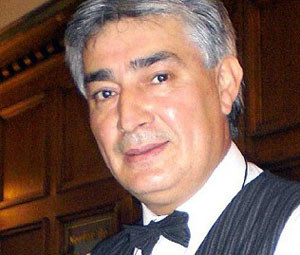Memory training with the waiters of Buenos Aires
 Buenos Aires - Over 15 separate types of coffee are on the menu together with various teas, juices, lemonades and food dishes - but Omar Velusio never makes a mistake when it comes to taking an order. "I have no problem remembering the orders from up to five tables," says the waiter, "after that it gets more difficult. Especially when guests order a meal as well. But thanks to my experience it works itself out."
Buenos Aires - Over 15 separate types of coffee are on the menu together with various teas, juices, lemonades and food dishes - but Omar Velusio never makes a mistake when it comes to taking an order. "I have no problem remembering the orders from up to five tables," says the waiter, "after that it gets more difficult. Especially when guests order a meal as well. But thanks to my experience it works itself out."
Velusio has been working in Cafe de los Angelitos for the past 14 years. It is one of the most traditional of cafes in Buenos Aires and writer Jorge Luis Borges is reputed to have had drunk a cafe con leche (cafe au lait) there. Velusio always serves guests properly dressed in a shirt, waistcoat and bow tie, but he never uses a notebook - "That's a tradition here."
His colleague Jorge Osuna, who waiters in Cafe Richmond in Buenos Aires' pedestrian zone, also never makes a written note of his guests' wishes. "It was difficult sometimes in the beginning to remember everything. But after 22 years it's not a problem anymore."
Waiters in the Argentine capital - at least in the traditional cafes - don't use notebooks, says the 54-year-old. "That developed over time. Back in the days when there were no tills everything worked by calling out an order. We do have modern tills today but it has become a matter of honour."
The waiters' reputation for having excellent memories has spread far and wide and some have even become the focus of scientific studies. "I've always wanted to conduct a study of these waiters," says Argentinean memory scientist Tristan Bekinschtein who works at a Cambridge university. "Their ability to remember many orders at the same time impressed me as a child."
Together with two colleagues from Buenos Aires the 33-year-old began an experiment and has now published his findings in the journal Behavioural Neurology. He has arrived at the following conclusion: "The waiters use a strategy that we call 'chunking.' They remember the person, the place where they are sitting, their order and link these three elements together. They can do that at an extraordinary speed."
It is all a matter of experience. "Most waiters with whom we have spoken never received any real training and they don't follow any conscious strategy. They just got that way over the years."
As part of the experiment Bekinschtein and his colleagues gathered together eight people at a table and got them to make different orders. "We made sure the guests were similar in appearance and not dressed in an exceptional manner in order not to influence the results," says Bekinschtein. "Naturally they were not allowed to order anything unusual. Whisky with olives was not allowed."
The waiters had no problem remembering the orders but even when the guests changed places there were relatively few mistakes.
Thanks to their long years of experience the waiters of Buenos Aires have developed exceptionally good memories, says Bekinschtein. But non-waiters can still learn a lot from them. "According to the latest research anyone who wants to think faster should not only sleep better and live more healthily, they should also engage in a few memory tests every day."
The important thing is that these tests must exercise different parts of the brain. "Sudoku is useless. It's better to play an old game like 'Memory' which is based on the same 'chunking' that waiters use."
On the other hand you can also console yourself with the knowledge that even Buenos Aires waiters make mistakes. "Sometimes I get confused," admits Jorge Osuna from Cafe Richmond. "Usually when it comes to spaghetti sauces."
Internet: Study by Tristan Bekinschtein at http://trisbek.googlepages.com/065-070.pdf. (dpa)